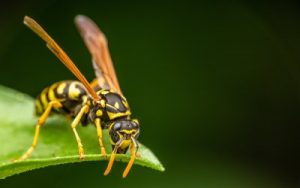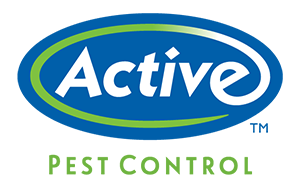How To Prevent Wasps, Hornets & Bees – and Avoid Stings
Serving Atlanta Metro | Columbus | Augusta | Savannah

Living in Georgia, you quickly learn that the best way to deal with stinging insects is to prevent them from nesting on your property in the first place.
This is because it’s almost always easier to do preventative maintenance beforehand than it is to knock down a nest, deal with the fallout, and make sure the stinging insects don’t come back.
By taking proactive, preventative steps—like sealing entry points, removing attractants, and keeping your yard tidy—you can discourage stinging insects from nesting near your home.
With that in mind, the experts at Active have put together this practical guide to preventing wasps, bees, and other stinging insects.
Preventing Wasps, Hornets & Bees in Your Yard
As with all types of pests, the key to prevention is making your property less attractive than others.
Wasps, hornets, and bees are naturally drawn to outdoor spaces that provide food, water, and shelter, making your yard an appealing spot for them to build nests.
Understanding what attracts these pests and taking proactive steps to discourage them is essential to maintaining a safe and enjoyable outdoor area for your family and pets.
- Don’t Give Them Access to Food:
This can be a problem because whether it’s barbecues, picnics, or kids with ice cream, eating food outside is a part of summer. Put away food and drinks promptly after eating a meal outside. Keep sugary drinks closed or covered to keep wasps out. When you put food or food-related trash in a trash can, close the lid securely.
Uncovered trash bins, sugary drinks, fallen fruit, standing water, and flowerbeds can all serve as magnets for these pests. Make sure food waste is securely bagged and trash bins have tight-fitting lids to keep pests out. Remove fallen fruit from trees, as the sugary juices are irresistible to stinging insects.
Even flowerbeds with fragrant blooms can attract these pests, so placing them further away from outdoor seating or play areas can help reduce the risk of encounters. - Eliminate Standing Water:
Eliminating excess moisture can help you avoid all kinds of pests, both indoors and out. All pests need to drink water, so if they can’t find it on your property, they’ll have to go somewhere else to find it.
Birdbaths, clogged gutters, poorly draining flowerpots, and even pet water bowls left outside can serve as water sources for wasps, hornets, and bees. Regularly inspect your yard for areas where water collects, and take steps to eliminate these sources.
Clean out gutters, empty or refresh outdoor water bowls frequently, and fill in low-lying areas in your yard where puddles might form. If you have water features like fountains or ponds, ensure they’re properly maintained with circulating water to make them less accessible to pests. - Debris, Waste, and Vegetation:
A tidy yard not only looks better but also discourages stinging insects from making your property their home. Wasps, hornets, and bees often seek shelter in debris-filled areas, overgrown vegetation, or cluttered corners. These spots provide the perfect environment for them to build nests undisturbed.
To prevent this, regularly clean up yard waste such as fallen leaves, branches, and grass clippings. Keep shrubs and bushes trimmed, and avoid letting vegetation grow too close to your home. Pay particular attention to eaves, sheds, and outdoor structures where nests are commonly found. Dispose of waste promptly, and store woodpiles or compost bins away from high-traffic areas.
How To Prevent Wasps, Hornets & Bees in Your House
What’s worse than wasps nesting in your yard? Wasps nesting in your house.
It sounds like a nightmare scenario, yet it’s a lot more common than you would think. Here’s how you can protect against it and what you should do if it happens. Fortunately, with a few proactive steps, you can minimize the chances of these pests invading your living space.
Identify and Seal Entry Points
Cracks, gaps, and openings in walls, windows, or roofing are prime entry points for wasps, hornets, and bees. Inspect the exterior of your home thoroughly, paying special attention to areas where siding meets other materials, or where vents and utility lines enter the house.
Use caulk or weatherstripping to seal gaps and install screens on vents or windows to keep stinging insects out.
Manage Food Sources
Like outdoors, food sources inside your home can attract these pests. Store sugary foods, honey, and fruit in airtight containers, and wipe down counters and surfaces to remove food residue. Take out trash regularly and ensure bins have tight-fitting lids.
Even small spills or crumbs can attract these insects, so maintaining a clean kitchen is essential.
Remove Smells That Attract Them
Wasps, hornets, and bees are highly sensitive to smells and can be drawn to floral scents from candles, air fresheners, or perfumes.
Consider using unscented products indoors if you’ve had problems with these pests in the past. Strong natural repellents like peppermint oil can also be used around doors and windows to deter them.
Eliminate Access to Water
Standing water inside your home can be just as much of an attractant as it is outdoors. Check for leaks in sinks, pipes, or air conditioning units and fix them promptly. Dry damp areas, such as basements or laundry rooms, to avoid creating a water source for pests.
Conduct Regular Inspections
Early detection can save you the hassle of dealing with a larger infestation. Regularly inspect areas like attics, basements, and crawl spaces for signs of nesting activity. Be particularly vigilant in spring and summer, when wasps, hornets, and bees are most active.
Call a Professional for Persistent Issues
If you notice frequent activity or suspect a nest inside your home, it’s best to contact a pest control professional. Active Pest Control’s experienced team can safely and effectively handle wasps, hornets, and bees, giving you peace of mind.
Say Goodbye to Pest Problems for Good!
Ready for your FREE quote?
Fill out the form below and we’ll be in touch!
*During normal business hours. After hours inquiries will be returned the next business day.
Can You Repel Wasps, Hornets & Bees Naturally?
Yes, there’s evidence that planting certain plants in your garden can affect bees and wasps. From essential oils like peppermint and clove to strategic landscaping with insect-repelling plants, there are many ways to make your property less inviting. If you want to discourage bees and wasps from your property, consider planting some of these plants that they hate – and see if any of the plants that they love are lurking nearby.
Alternatively, if you’re trying to attract pollinators, you can plant some of these plants that they love.
Plants That Bees and Wasps Hate
- Basil
- Citronella
- Eucalyptus
- Geraniums
- Marigolds
- Peppermint
- Spearmint
- Thyme
- Wormwood
Plants That Bees and Wasps Love
- Black-eyed Susan
- Honeysuckle
- Lantana
- Lilacs
- Perennial Yarrow
- Poppies
- Pale Purple Coneflower
- Sweet Fennel
- Wisteria
- Queen Anne’s Lace
- Sedum
- Snapdragon
- Sunflowers
How to Avoid Getting Stung
The best way to reduce the risk of getting stung by wasps, hornets, or bees is through proactive prevention. Fewer stinging pests in your environment mean fewer chances of accidental encounters that could lead to stings. And without nests nearby, stinging insects are less likely to feel territorial or defensive, reducing the likelihood of aggressive behavior.
To reduce the chance of being stung, it’s also advisable to avoid wearing sweet fragrances, keep food and drinks covered, wear shoes when outdoors, and avoid swatting them or making sudden movements that may make them feel threatened.
By focusing on prevention, you not only protect your home from infestations but also create a safer environment for you and your family, ultimately lowering the chances of being stung.
Bee, Wasp, and Hornet Prevention and Control
At Active Pest Control, we’re proud to be a leading authority in bee, wasp, and hornet control in the region. With a deep understanding of what attracts these stinging pests to your property and how to safely repel them, our team of experts is equipped with the knowledge and tools to ensure your home remains a sting-free zone.
Don’t let the threat of stings disrupt your summer — call us today to discuss removal and prevention solutions.
Back to Bee, Wasp, & Hornet Exterminators, Control & Removal
FAQs:
What really keeps wasps away?
Wasps are repelled by strong scents such as peppermint, eucalyptus, and citronella. Keeping food sources covered and removing standing water can also discourage them.
Regularly inspecting your property and sealing entry points to potential nesting areas will reduce the likelihood of wasps settling nearby.
How do I permanently get rid of wasps?
To permanently remove wasps, it’s essential to eliminate their nests early and prevent future nesting sites. Sealing cracks and gaps in your home’s exterior, removing attractants, and using professional pest control services will ensure long-term protection from wasps.
How do you keep hornets away?
Hornets can be kept away by using natural repellents like peppermint or clove oil. Removing food and water sources, sealing entry points to your home, and trimming back overgrown vegetation will also discourage hornets from nesting near your property.
What discourages hornets?
Strong scents like peppermint, citronella, and eucalyptus oil are effective at discouraging hornets. Additionally, maintaining a clean yard free of fallen fruit and keeping trash bins covered can make your property less attractive to hornets.
What do bees hate most?
Bees dislike strong smells such as cinnamon, garlic, and peppermint. These natural repellents can be used around entryways or nesting areas to discourage bees from getting too close to your home.
How to prevent bees from nesting in your yard?
To prevent bees from nesting in your yard, remove food and water sources, seal potential entry points, and use natural deterrents like peppermint or cinnamon around areas where bees may try to build nests. Keep flowerbeds away from high-traffic areas to minimize attraction.
For eco-friendly nest removal, trust the experts at Active Pest Control. Contact our team today!
How to Prevent Wasps and Bees – and How to Avoid Getting Stung in Georgia
Serving Your Pest Needs for Over 35 Years Across Georgia
McDonough | Conyers | Lawrenceville | Alpharetta | Marietta | Columbus
Newnan | Locust Grove | Rome | Atlanta | Brunswick | Byron | Augusta | Savannah
Home » Bee, Wasp, & Hornet Exterminators, Control & Removal » How to Prevent Wasps and Bees – and How to Avoid Getting Stung

